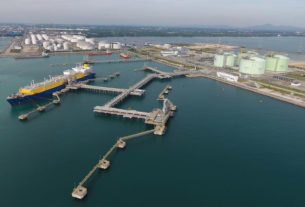Here are some facts to ponder. Over the next 10 years, Bangkok, Manila and Kuala Lumpur will spend billions of dollars to expand and enhance their existing mass rapid transit systems. Each city has a comprehensive plan to improve their public transportation systems to cope with growth and ensure that they do not become gridlocked.
Jakarta also has a plan. It is to build an MRT that will stretch 15.2 kilometers from Lebak Bulus in the South to Central Jakarta. The city has proposed a network of 110 kilometers by 2027, which would dramatically ease traffic congestion.
All the others cities mentioned above understand that efficient public transportation is critical to sustained growth. The Jakarta administration is also aware of this, but it has been stuck in planning mode for 25 years. We can only hope that projects actually move from the planning stage to the building stage sometime this year.
The government has set aside $13.5 billion for infrastructure development in 2011, which is a 28 percent increase over 2010, so the money is there. Private investors have also shown a keen interest in participating in projects such as toll roads, railway lines and the MRT. But somehow, for some reason, these projects have been very slow in getting off the ground.
It is thus not surprising that President Susilo Bambang Yudhoyono lost his patience at the coordination meeting in Bogor. He ordered Jakarta Governor Fauzi Bowo to achieve significant improvement in the city’s traffic by 2014 on the road to solving the problem by 2020. This is no easy task, but he promised to back the governor by allocating resources from the central government.
The president is right in pointing out that many other cities also have a high number of vehicles but are able to manage their traffic much better. As he said, “Why not learn?”
Indeed, we should learn from how other megacities that have conquered their traffic woes. New Delhi, for example, appointed a no-nonsense technocrat to oversee the construction of its Metro system and — to the surprise of many observers — it was completed within its target time and below budget. Perhaps the city administration and the central government should empower an individual or a group of individuals to drive Jakarta’s public transportation development. These individuals should be given the power to make decisions but also be held accountable for delays and stoppages.
It is clear that the current methods and systems are not working. Although work has started on the construction of new inner-city toll roads, these are inadequate to meet the demands of a rapidly growing city. Jakarta needs a bold plan with the political will to implement it if we are to ever enjoy congestion-free roads. The alternative is just too miserable to contemplate.
Source: http://www.thejakartaglobe.com/opinion/editorial-learning-from-other-cities-traffic-solutions/424302

